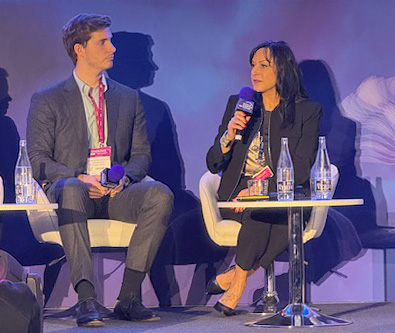Gaming
Tribal members speak at international gaming conference

By Nicole Montesano
Smoke Signals staff writer
Two Tribal member were invited by the Indian Gaming Association to speak at the ICE World Gaming Forum in Barcelona, Spain, in January. The conference attracted some 55,000 attendees.
Tribal Council member Denise Harvey, who is a Pacific Northwest delegate on the IGA board of directors, and Spirit Mountain Casino CEO Camille Mercier spoke on different panels.
They addressed Indian gaming in the United States, and the importance of Tribal sovereignty in enabling Tribes to create a much-improved economic standing for their members, as well as how Tribes have used that standing to improve their surrounding communities.
“I spoke on two panels; one was on gaming in general and our operations,” Harvey said. “The other panel was on the philanthropic and foundation process. There’s no tracking of how these companies or these casinos and folks are doing charitable donations, but it’s in the hundreds of millions of dollars. Nobody ever talks about that, about the positive side of gaming. Everybody likes to point out gambling addiction and those things. But there’s a whole side that nobody ever talks about and charitable giving is pretty big across the world.”
Gaming is a huge business worldwide, she noted.
“I know it came up in the panel that gaming worldwide is a $500 billion industry,” Harvey said. “Indian gaming in the U.S. is $41.9 billion industry and those were numbers prior to COVID-19, and we’ve still been able to continue and thrive and come back to those pre-COVID numbers.”
The audience, Harvey said, was “really interested in how we were doing things and how we show to the public how much we give.”
She noted that the casino maintains a bulletin board listing its most recent quarterly donations for guests.
Spirit Mountain Community Fund, the Tribe’s charitable arm, was founded in 1997, two years after the casino opened. In the nearly three decades since, it has become a powerhouse, funding not only Tribal programs and members, but also programs throughout the region. The Tribe donates 6% of casino revenue to registered nonprofit organizations in northwest Oregon, as well as government agencies in Lane, Polk, Tillamook and Yamhill counties, and to the nine federally recognized Tribes of Oregon, the fund notes on its website. In 28 years, it has provided 3,394 grants totaling $100,177,653.
Its program of giving “continues the Native tradition of potlatch, a ceremony at which good fortune is distributed,” the website states. “Through our grant programs, we promote the sustainability, inclusion and advancement of underserved communities in Oregon, while being reflective of the Tribe’s history, culture and values.”
It was Harvey’s second time speaking at the conference and Mercier’s first. Both said they would be interested in returning if the gaming association were to again pay for most of the cost.
Mercier said she found the experience valuable and was taken aback by how immense the conference was.
“I was honored to be there ... it was exciting to represent the Tribe, but also you know, all Native American Tribes at such an international stage,” Mercier said.
The panel she spoke on “went so long that we didn’t have time for questions,” she said, but she’s collected a number of people’s contact information for later follow-up, including a man from Brazil. “They’re just really on the precipice of learning all they can about gaming and how to bring it forward in Brazil,” Mercier said. “So I look forward to learning more from him.”
Mercier and Harvey said it was especially interesting to talk about the differences between casinos in different parts of the world, which can look very different. For example, they said, in European countries, casinos tend to be much smaller and lack associated amenities such as restaurants and hotels.
In addition, Mercier said, “their business models and strategies are different,” along with the types of games they focus on. Slots are emphasized in the United States, while table games receive far more focus in European countries.
The use of artificial intelligence was also discussed extensively, both Harvey and Mercier said. Mercier spoke on a panel about how AI is helping to shape the future of casinos.
“The technology piece was fascinating,” Mercier said.
It included both artificial intelligence and use of robots, both of which are likely to reach Oregon sooner or later, she said.
“I think it will be coming everywhere at some point,” Mercier said. “A lot of regulations are being looked at right now, for safety, but I think there will be things coming that we just can’t avoid. AI, the computer learning is amazing, but what I think it will help us do is improve customer transactions and experiences and I think that’s the exciting part for us. I believe there are casinos in the U.S. that have a robot dog that greets guests, does dog tricks but also are looking for weapons and doing facial recognition. There are some interesting things happening in the business.”
